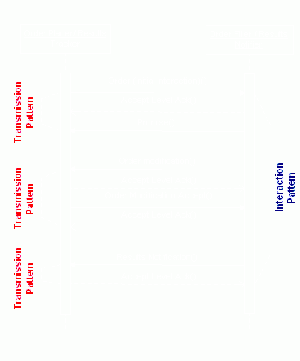Difference between revisions of "Communication Process Model"
Rene spronk (talk | contribs) (add detail) |
Rene spronk (talk | contribs) (add MnM manadatory payload motion) |
||
| Line 24: | Line 24: | ||
initiating interaction of each Transmission Pattern results in messages | initiating interaction of each Transmission Pattern results in messages | ||
linked to it by means of the Transmission Wrapper. | linked to it by means of the Transmission Wrapper. | ||
| + | |||
| + | == Notes == | ||
| + | |||
| + | All interactions have to have a payload model, to ensure all interactions contain some form of business-process-identifier, which allows the linking of individual Transmissions within an Interaction Pattern. | ||
| + | ''20060113: MNM WGM: All app level interactions must have a defined payload model. for simple accept/refusal interactions the payload may be limited to a simple shared message MT referencing the request being accepted/refused. (Rene/Heath, 6-0-2)'' | ||
| + | Ongoing discussion: there are use-cases where a payload may not make sense. | ||
Revision as of 12:30, 22 January 2006
An Interaction Pattern is a sequence of interactions that are related because they belong to one and the same business process. An Interaction Pattern consists of 1 or more Transmission Patterns. The interactions may be linked by business process identifiers such as "Placer Order ID", "queryId", "PrescriptionID".
At this level of abstraction the delivery method of the interactions is of no relevance whatsoever.
- The use of some Interactions (e.g. Syntax Level Acknowledgement,
Polling Interaction, Query Continuation/Abort Interaction and Batch Based Interactions) is not relevant for an Interaction Pattern, this is relevant at the Transmission level only.
- Most Storyboard Diagrams in the HL7 v3 standard describe an
Interaction Pattern.
Examples
A Laboratory Order, followed by a Promise, a modification of the Order by the Laboratory, and a final labresult constitutes an interaction. The interaction pattern consists of 3 Transmission Patterns. The initiating interaction of each Transmission Pattern results in messages linked to it by means of the Transmission Wrapper.
Notes
All interactions have to have a payload model, to ensure all interactions contain some form of business-process-identifier, which allows the linking of individual Transmissions within an Interaction Pattern. 20060113: MNM WGM: All app level interactions must have a defined payload model. for simple accept/refusal interactions the payload may be limited to a simple shared message MT referencing the request being accepted/refused. (Rene/Heath, 6-0-2) Ongoing discussion: there are use-cases where a payload may not make sense.
